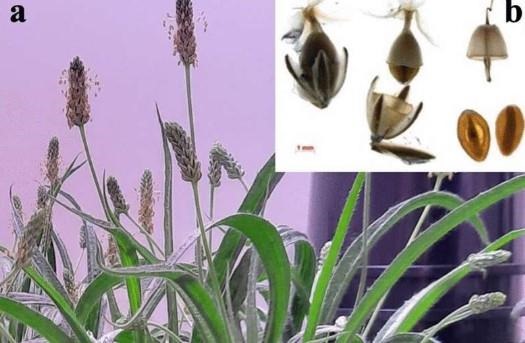
Plantago ovata. (a) A two-and-a-half-month-old plant. (b) Capsules containing two seeds each are fully ripened and shatter easily at around 25 days post anthesis (DPA).
Scientists have for the first time constructed the reference genome for the source of the popular fiber supplement, psyllium husk, which could boost supplies of the versatile plant-derived product.
University of Adelaide experts conducted research on psyllium, also known as Plantago ovata.
"We extracted and sequenced the deoxyribonucleic acid (DNA) from leaf tissue to construct the chromosome-level reference genome for Plantago ovata and used ribonucleic acid (RNA) from other parts of the plant to predict the function of its genes," said the University of Adelaide's Professor Rachel Burton, a researcher from the School of Agriculture, Food and Wine.
"This is a significant development because it will pave the way for improvements to the quality and quantity of psyllium crops."
DNA is the molecule that contains genetic information needed for the development and functioning of an organism while RNA acts as a messenger, carrying instructions from DNA to build proteins.
This finding has been published in the journal Scientific Reports and is the result of a decade-long investigation by University of Adelaide researchers into the genetic makeup of the plant.
Psyllium has been used for food and medicinal purposes for thousands of years.
The seeds of the plant are milled to produce a soluble fiber used in pharmaceuticals and supplements to improve gut health and control blood cholesterol.
Psyllium is also a common ingredient in gluten-free food. The seeds and their husks are naturally gluten-free and when mixed with water, produce a sticky substance that replicates some of the functions of gluten in bread.
This quality makes psyllium an essential ingredient in gluten-free bread and it can be used in a whole range of other baked goods. With the market size of gluten-free foods expected to reach USD$8.3 billion in 2025, demand for psyllium is predicted to increase.
The plant is highly susceptible to changes in environmental conditions and diseases which not only affects the yield, but also the price and quality of this valuable commodity.
"To date, efforts to improve the quality and quantity of psyllium husk have been hampered by the lack of a reference genome," said the University of Adelaide's Dr. James Cowley, who is also from the School of Agriculture, Food and Wine and co-authored this study.
Click here to see more...